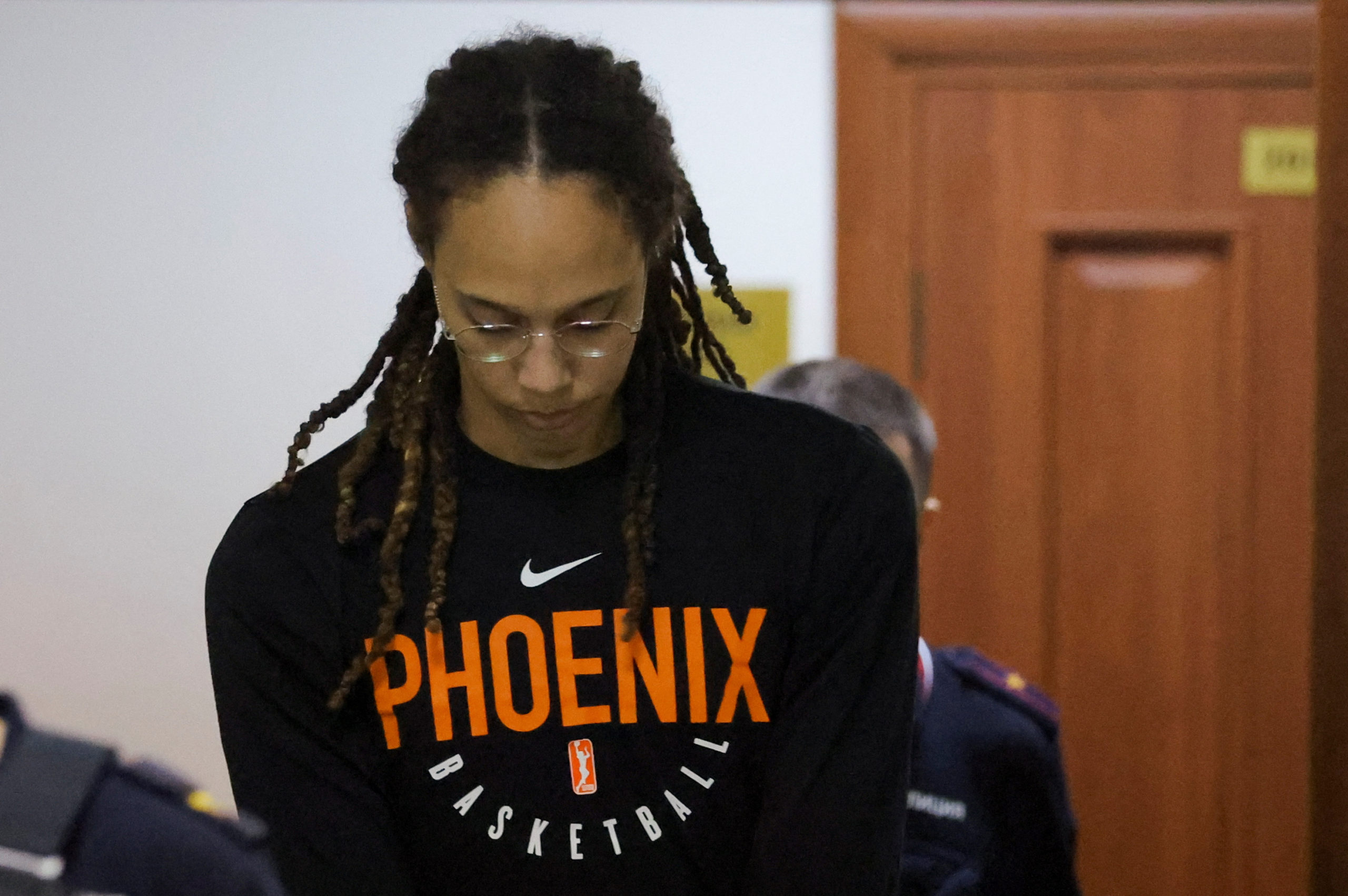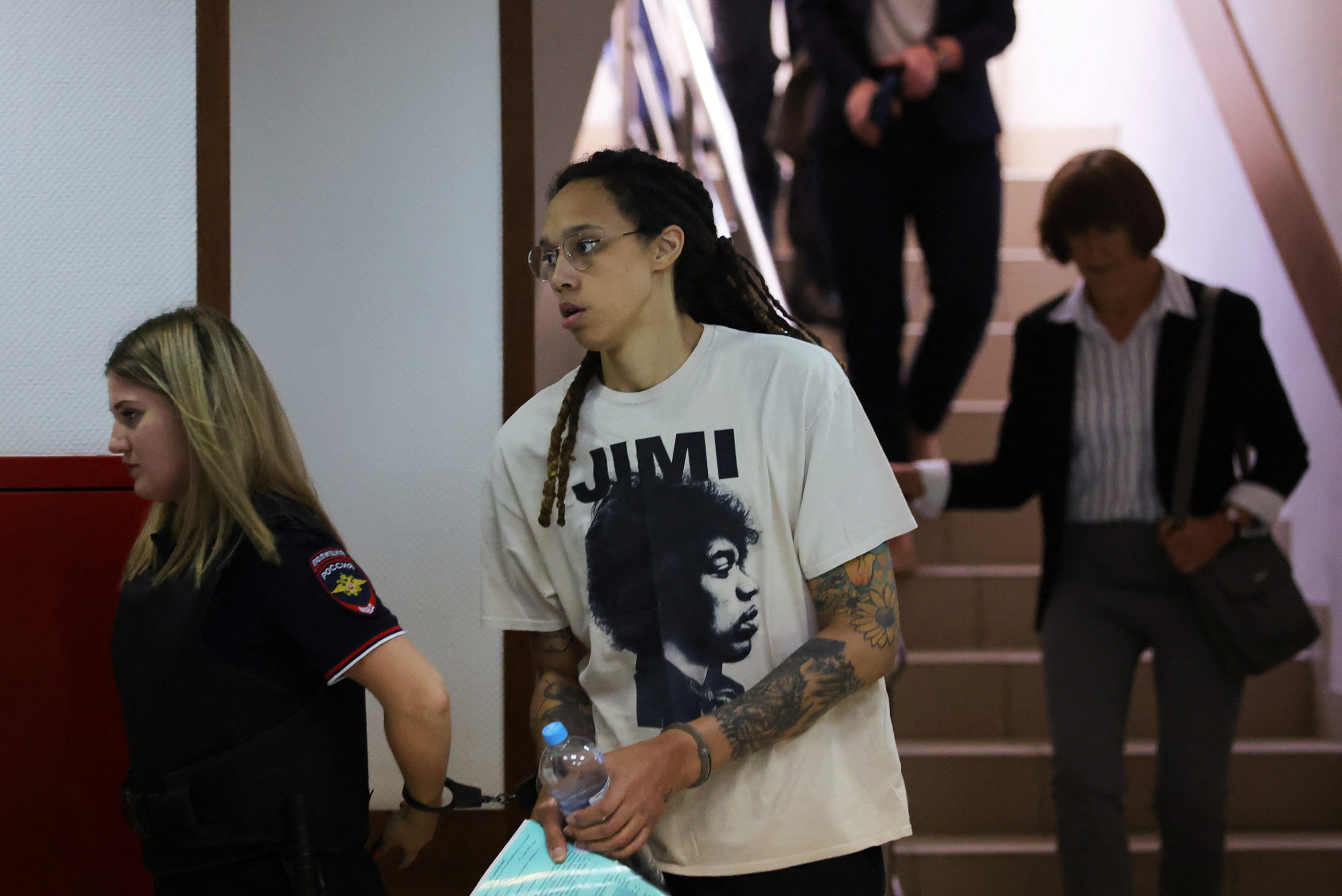US basketball star Brittney Griner says didn’t intend to smuggle drugs into Russia

FILE PHOTO: U.S. basketball player Brittney Griner, who was detained at Moscow’s Sheremetyevo airport and later charged with illegal possession of cannabis, is escorted before a court hearing in Khimki outside Moscow, Russia July 27, 2022. REUTERS/Evgenia Novozhenina/Pool
US basketball star Brittney Griner said at her trial Wednesday she had no intention of smuggling drugs into Russia and that she came to the country despite US warnings so as not to let down her Russian team.
Griner, a two-time Olympic basketball gold medallist and Women’s NBA champion who had played in Russia, was detained in February, just days before Moscow launched its offensive in Ukraine.
She was charged with drug smuggling for possessing vape cartridges with cannabis oil and is standing trial in the town of Khimki just outside Moscow.
Speaking at the trial on Wednesday, Griner said she still did not know how the cartridges ended up in her bag.
“I did not think of or plan to bring banned substances into Russia,” said Griner, wearing a Phoenix Mercury T-shirt and black basketball trousers.
“I did not intend to break Russian law,” she added, saying that she “was in a rush packing”.
She also said she had “no intention to use” a substance banned in Russia.
“I wouldn’t do anything that would hurt my team.”
She said she was regularly tested by US, Russian and European leagues.
Griner was detained when she came to Russia to play club basketball with UMMC Ekaterinburg during the US off-season — a common path for American stars seeking additional income.
She said she was tired at the time.
“I was just recovering from Covid,” she said. “I had it in February right before the break. 102 degree fever. I could barely walk from my bed.”
‘My career is my life’
Griner has pleaded guilty and faces up to ten years in a Russian prison.
Her case has been enmeshed in the freeze in US-Russia relations since President Vladimir Putin sent troops into Western-backed Ukraine on February 24.
US President Joe Biden has spoken to the star’s family, saying he will make bringing her home a “priority”.
The 31-year-old WNBA star said she had permission from a US doctor to use medicinal cannabis to relieve pain from her many injuries — “from spine to cartilages.”
“I was in a wheelchair for four months. I had a sprained ankle,” the athlete said.
She said she used medicinal cannabis “only during breaks and when there are no competitions.”
“It helps me a lot,” she said.
Griner added that she did not want to use other painkillers because they have “really bad side effects.”
She said she had arrived in Russia despite US authorities recommending against travel to the country and said that she would “never” risk the championship.
“Nothing would make me let down my team,” she said.
“My career is my whole life. I’ve dedicated everything, my body, time away from my family,” she said. “I played with injuries.”
‘You are guilty’

U.S. basketball player Brittney Griner, who was detained in March at Moscow’s Sheremetyevo airport and later charged with illegal possession of cannabis, is escorted before a court hearing in Khimki outside Moscow, Russia July 1, 2022. REUTERS/Evgenia Novozhenina
Griner also gave a detailed account of how she ended up behind bars in Russia and stressed that she had no access to a lawyer when she was held for hours with her phone taken away and no adequate interpreter.
She said she was stopped at the airport in Moscow when her bag was scanned.
“In seven years of going to Asia and Russia, I’ve never seen so many people working (in the airport) that day,” she said.
She also said she had spices and barbeque sauce in her luggage but the spices had not been checked.
When she was brought to a Moscow court she was given a packet of documents to sign, she said.
“The translation was not very good,” she said.
“‘Well, in general, it says you are guilty'”, she said she had been told by an unnamed law enforcement officer.
Russia and the United States regularly clash over the detention of each other’s citizens and sometimes carry out exchanges in scenes reminiscent of the Cold War.
The next hearing will be on August 2.